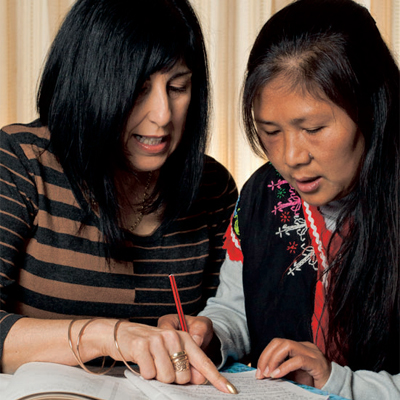Volunteers are the lifeblood of our society. More than six million of us selflessly donate 700 million hours a year to meaningful causes, organisations and to helping others, without seeking recognition or praise. For most, putting others first is just second nature, as Cameron Tait found out.
Lisa Muscari was trapped between two worlds. She remembers sitting in the classroom knowing the answers to questions, but not being able to speak them.
The young Australian-born daughter of Sicilian migrants who arrived after the Second World War felt lost.
At school, everything was in English; at home, everything was in Italian. It was the 1970s and ethnic discrimination was rife on both sides.
‘‘My parents came here with nothing and had to start all over again,’’ she says. ‘‘Dad went to English classes, but mum didn’t, so I went to school with very little English skills. It was confusing. I was learning to read, but nobody at home could help me.
‘‘All through primary school I was frustrated. It took so long to make new friends and it wasn’t until high school that I started to feel accepted.’’
The struggles she endured growing up have inspired the Hoppers Crossing resident to volunteer with AMES, teaching English to newly arrived refugees and migrants, at their homes and in the classroom at Werribee. One of her students is Roo Roo, a Karen refugee who fled Burma with her family.
‘‘They were living in the jungle and the military would regularly come in, kill their people and burn their houses,’’ Lisa says.
‘‘One day, they burned everything and Roo Roo and the others had to go to a refugee camp — her husband lost his entire family apart from two nieces. It takes a lot of courage to leave everything you know.’’
With a strong resolve to make a better life for her children, Roo Roo receives home tutoring from Lisa every Thursday.
‘‘In the camps, they learn the alphabet and basic English,’’ Lisa says, ‘’but there’s so much they don’t know. They only wear a piece of cloth in the jungle, so they have to learn how to dress, how to eat with a knife and fork, even how to use a toilet.
‘‘With Roo Roo, we’ve progressed from learning the alphabet to reading stories, to wanting to write her own stories, to going for her learner’s permit.
‘‘She’s hungry to learn. Her husband says they’re so blessed their children can go to school every day. They’ve grown up in a world of fear. When they first came to Australia they would see a police officer and hide thinking they would kill them — they can’t believe the police are here to help.’’
Lisa says the experience has been an ‘‘eye-opener’’. ‘‘It’s been life-changing. I look at my life and my children and realise I’m so lucky. It gives you such a good feeling to be able to help somebody else.’’
According to the Bureau of Statistics, volunteering rates are highest among those aged 45-54, while 18-24-year-olds make up fewer than 10 per cent.
Natasha Stevic has a simple attitude towards volunteering — she just enjoys helping people.
In her role as a paralegal at Brimbank Melton Community Legal Centre, the second-year university business/law student is getting a taste of her future career.
As well as answering phones, drafting letters for solicitors and making appointments, she sits in on client interviews.
‘‘Many of the people we see are in desperate situations. They often have nowhere else to go. It gives you a good feeling to be able to help somebody.’’
Bill Robson remembers the scene as if it were yesterday. It was the small town of Theodore in country Queensland in January last year. The Sunshine State was in the grip of a flood of biblical proportions, which swamped two-thirds of it and killed 35 people.
A volunteer with Bacchus Marsh SES, Bill and his small team hit the ground as the water receded and Theodore’s 400 or so residents were allowed to return home. The scene was one of pure carnage.
‘‘Every house, the hospital and the shopping centre had a foot of mud in it,’’ Bill says. ‘‘My team spent a lot of time in the local school and we would open cupboards in the classroom and find snakes and cane toads.
‘‘It was complete and utter devastation. Knowing people were coming home to find everything they once had was destroyed was difficult to come to terms with — so many houses had to be pulled down.
‘‘Just trying to comprehend the volume of water which swept through the town was difficult unless you saw it with your own eyes. Some people were reluctant to ask for help, but we would see them struggling and ask if they needed a hand and they were extremely thankful.
‘‘The resilience they showed was amazing.’’
A former Moorabool Young Citizen of the Year, Bill was only 16 when he and a mate joined the SES.
Now he doubles as one of three deputy controllers at the Bacchus Marsh unit and he’s also a CFA volunteer.
‘‘I was still at school and we didn’t know what we wanted to do. We were considering the police force, so we thought joining the SES would give us some exposure to the emergency services.
‘‘A few of our members have been around since the start of our unit in 1980, so they taught us everything we needed to know.
‘‘We’ve got a great support network. At the first few car crashes I attended, I always had the more experienced members watching over me, ready to jump in if I wasn’t coping.’’
Whether it’s responding to floods, bushfires, cleaning up after storm damage, or simply handing out coffee and a biscuit at Driver Reviver sites, SES members are always there in times of need.
But there’s one thing that never gets easier — attending road crashes.
Not only do SES volunteers liaise with paramedics and police at accidents, but they’re regularly asked to remove occupants from vehicles.
‘‘Every crash affects you differently,’’ Bill says, ‘‘but often the overwhelming emotion is one of frustration.
‘‘We’ll see drink-drivers, somebody who may have driven too fast or hasn’t slowed down in wet weather, and you think to yourself, ‘this didn’t have to happen.’
‘‘It’s unpredictable. We never know what we’ll be called to next.’’
Each February, the unit holds a fund-raising appeal in which members knock on every door in the Moorabool Shire.
They’re constantly overwhelmed by the level of support they receive.
‘‘We rely on the generosity of the community,’’ Bill says.
‘‘We’re under no obligation to do what we do, but when we receive a call we know somebody needs help — that’s what motivates us.
‘‘Our satisfaction comes from doing a good job.’’
For volunteer opportunities in your area, phone your council or visit govolunteer.com.au







